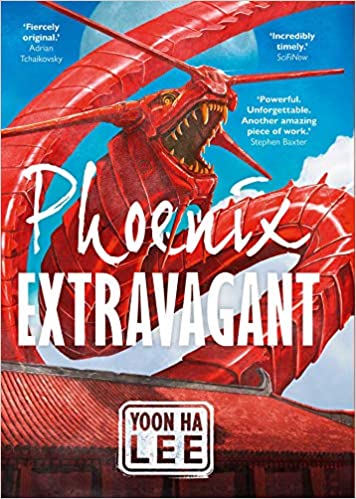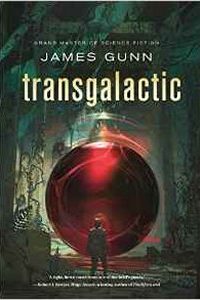Liz Bourke Reviews Phoenix Extravagant by Yoon Ha Lee
 Phoenix Extravagant, Yoon Ha Lee (Solaris 978-1-78108-794-7, $24.99, 416pp, hc) October 2020.
Phoenix Extravagant, Yoon Ha Lee (Solaris 978-1-78108-794-7, $24.99, 416pp, hc) October 2020.
Yoon Ha Lee is well known for his science fiction and his short fiction. His debut novel, Ninefox Gambit, won the 2017 Locus Award for Best First Novel, and was also nominated for the Hugo, Nebula, and Clarke Awards. His second and third novels, Raven Stratagem and Revenant Gun, picked up Hugo nominations too, and both his short fiction collections – Conservation of Shadows (2013) and Hexarchate Stories (2019) – were well received, as was his first middle-grade novel Dragon Pearl (Rick Riordan Presents, 2019). Phoenix Extravagant marks his first fantasy novel for adults: a standalone, although there’s plenty of room for more stories in this setting.
What a setting it is. There’s an increasing trend in fantasy to move away from settings based, however loosely, on elements from medieval or early-modern history and into industrialised or industrialising settings that draw their influences directly from the material culture of the 19th and 20th centuries – and frequently interrogate questions of colonialism and imperialism. Phoenix Extravagant is one of these fantasies of modernity, strongly influenced by Korean history and folklore, and particularly by the Japanese domination (and 1910 annexation) of the Korean peninsula. In Phoenix Extravagant, the Razan Empire controls Hwaguk in a very similar case to how Japan annexed Korea, and mentions of pale-skinned ”Westerners” in response to whose military and economic power the Razanei have built up and consolidated their own power make the political analogues with our own history stand out even more strongly.
Gyen Jebi is a Hwagugin artist, and like many artists throughout history, Jebi needs a patron or a job in order to make ends meet, especially since their contentious relationship with their sister Bongsunga (standing in loco parentis since the deaths of their parents) means they’re reluctant to go back home and admit they could use help. Jebi isn’t a revolutionary (or even, really, very politically aware), and they’d pinned their hopes on a job with the Razanei Ministry of Art. With those hopes disappointed, and owing money to a moneylender, they’re easy prey for the Razanei Ministry of Armour. When the Deputy Minister himself offers them a job, it would be very impolitic to refuse, especially when the offer comes with a side helping of veiled threat.
The Ministry of Armour is responsible for the automatons that police Razanei-occupied Hwaguk, and Jebi’s new role is to paint the masks that give the automatons animation. Also part of Jebi’s job: finding out why the Ministry of Armour’s latest innovative project, a dragonlike automaton called Arazi, failed to work as intended. (But it’s not like the Ministry of Armour is telling Jebi the truth about what happened with the first field test.)
Their new job finds them pretty much a prisoner in the project rooms under the Ministry of Armour, closely supervised by the Ministry’s duellist prime, a woman of both Razanei and Hwagugin heritage called Dzuge Vei. There’s a secret to the animating of automatons: the pigments that animate them can only come from the destruction of art by dead artists. Jebi discovers that their people’s art is being destroyed in order to make Razanei tools of war, and they also discover that the truth about the dragon’s first field test is rather different than they were told. As they begin a relationship with Vei – one marked by both affection and mistrust – they learn that she was responsible for the death of their sister’s wife, and they also figure out how to allow Arazi to speak.
Arazi is self-willed, clever, enthusiastic about new experiences, friendly with Jebi, and rather against the idea of being a weapon. Jebi decides that their new dragon-friend should not be a weapon (especially since Arazi doesn’t want to be one) and tries to break the dragon out – stealing keys from their lover. Unfortunately, Jebi’s an artist, not a spy, and gets caught. Imprisoned and alone, it is in the course of being questioned that they learn they were offered the job in the Ministry of Armour to keep them on hand as leverage over their sister, who’s centrally involved in the Hwagugin resistance.
Vei comes to help them escape, and together all three of them (Arazi included) make it to the rebels – where Bongsunga tests both Jebi’s loyalty and Vei’s. Jebi, it turns out, is not very good at passing loyalty tests: they have a tendency to put their friends before causes.
The climax is a showdown between the resistance and the Ministry of Armour, a showdown to which both Jeb and Arazi are central.
This is an elegant, eloquent novel, tense and full of incident. The relationships between Jebi and Vei, and between Jebi and Bongsunga, are complicated. Those relationships are prisms through which we can see Phoenix Extravagant take on themes of loyalty and trust, belonging and right action, heritage and adaptation. The novel is also deeply concerned with art: art as art, art as useful object, art as history and heritage. The tension between the different uses of art, as functional objects and as markers of heritage, and the problem of art and colonisation – here devalued artworks from a colonised people are literally ground up to forward the military powers of the coloniser – are here reified and made manifest.
Jebi is a compelling character, and (I must point out) one of only a handful of explicitly nonbinary human viewpoint characters, much less protagonists, in novel-length works of science fiction and fantasy. It’s a delight to see a setting where nonbinary people are depicted as needing neither explanation nor apology, and that’s what we have here.
Phoenix Extravagant is, by my lights, a seriously good fantasy, and a wonderfully thoughtful book. Also, it has a strong sense of playfulness. Although it stands alone, there’s plenty of space for more stories in this setting, and even with these characters. I really hope to see them.
Liz Bourke is a cranky queer person who reads books. She holds a Ph.D in Classics from Trinity College, Dublin. Her first book, Sleeping With Monsters, a collection of reviews and criticism, is out now from Aqueduct Press. Find her at her blog, her Patreon, or Twitter. She supports the work of the Irish Refugee Council and the Abortion Rights Campaign.
This review and more like it in the July 2020 issue of Locus.
 While you are here, please take a moment to support Locus with a one-time or recurring donation. We rely on reader donations to keep the magazine and site going, and would like to keep the site paywall free, but WE NEED YOUR FINANCIAL SUPPORT to continue quality coverage of the science fiction and fantasy field.
While you are here, please take a moment to support Locus with a one-time or recurring donation. We rely on reader donations to keep the magazine and site going, and would like to keep the site paywall free, but WE NEED YOUR FINANCIAL SUPPORT to continue quality coverage of the science fiction and fantasy field.






